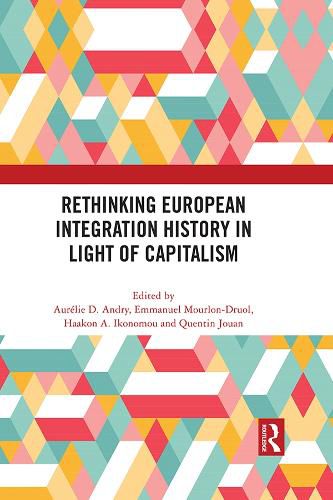Readings Newsletter
Become a Readings Member to make your shopping experience even easier.
Sign in or sign up for free!
You’re not far away from qualifying for FREE standard shipping within Australia
You’ve qualified for FREE standard shipping within Australia
The cart is loading…






This book outlines the possibilities and perspectives of an intertwining of European integration historiography with the history and concept of capitalism.
Although debates on capitalism have been making a comeback since the 2008 crisis, to date the concept of capitalism remains almost completely avoided by historians of European integration. This book thus conceptualizes 'capitalism' as a useful analytical tool that should be used by historians of European integration and proposes three major approaches for them to do so: first, by bringing the question of social conflict, integral to the concept of capitalism, into European integration history; second, by better conceptualizing the link between European governance, Europeanization and the globalization of capitalism; and thirdly by investigating the economic, political and ideological models or doctrines that underlie European cooperation, integration, policies and institutions. This analytical encounter between European integration history and capitalism allows for a better understanding of how today's "Europe" resulted from a complex social, economic and political conflict that took place in part at the European level.
The chapters in this book were originally published as a special issue of the journal, the European Review of History.
$9.00 standard shipping within Australia
FREE standard shipping within Australia for orders over $100.00
Express & International shipping calculated at checkout
This book outlines the possibilities and perspectives of an intertwining of European integration historiography with the history and concept of capitalism.
Although debates on capitalism have been making a comeback since the 2008 crisis, to date the concept of capitalism remains almost completely avoided by historians of European integration. This book thus conceptualizes 'capitalism' as a useful analytical tool that should be used by historians of European integration and proposes three major approaches for them to do so: first, by bringing the question of social conflict, integral to the concept of capitalism, into European integration history; second, by better conceptualizing the link between European governance, Europeanization and the globalization of capitalism; and thirdly by investigating the economic, political and ideological models or doctrines that underlie European cooperation, integration, policies and institutions. This analytical encounter between European integration history and capitalism allows for a better understanding of how today's "Europe" resulted from a complex social, economic and political conflict that took place in part at the European level.
The chapters in this book were originally published as a special issue of the journal, the European Review of History.